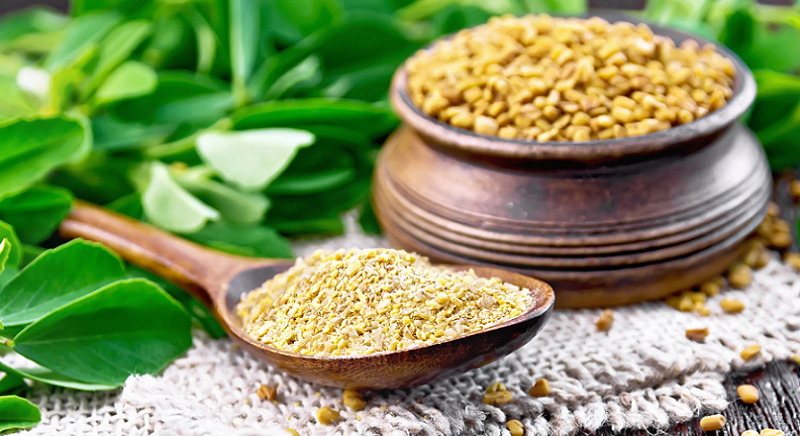In today’s fast-paced world, fluctuating blood sugar levels have become a pressing concern for millions. While modern medicine offers a plethora of options to manage this challenge, an increasing number of individuals are turning to nature for solutions. One such natural remedy, steeped in historical significance and backed by scientific research, is the fenugreek seed extract. This golden seed, utilized for millennia in traditional healing practices, is gaining momentum as a powerful ally against blood sugar irregularities.
Introduction to Fenugreek and Blood Sugar
In the modern age, as lifestyles become more sedentary and diets grow richer in processed foods, blood sugar imbalances are a burgeoning health concern for many around the globe. These imbalances can manifest in various ways, from minor energy fluctuations to severe conditions like diabetes. With the surge in these health issues, the quest for both medical and natural solutions has intensified.
Brief Overview of Blood Sugar Issues in Modern Society
Blood sugar, or glucose, is our body’s primary energy source, originating primarily from the foods we consume. It’s vital for the function of the brain, muscles, and other essential systems. However, in recent decades, there’s been a marked rise in conditions like diabetes, prediabetes, and insulin resistance. Factors such as poor dietary choices, increased stress, sedentary lifestyles, and genetic predispositions have played a significant role in this upward trend. Alarmingly, the World Health Organization (WHO) predicts a continued rise in diabetes prevalence unless proactive measures are taken.
The Search for Natural Remedies in Blood Sugar Control
While traditional medicine offers a range of treatments for blood sugar irregularities, many individuals and practitioners alike are leaning towards holistic and natural remedies. The allure of fewer side effects, the potential for holistic healing, and often a lower cost has driven interest in ancient remedies and herbs. From cinnamon to berberine, various natural compounds have shown promise in this realm.
Introduction to Fenugreek as a Solution
Among the myriad of natural remedies, fenugreek seed extract stands out. With a history dating back to ancient civilizations, fenugreek has been revered not only as a culinary spice but also as a potent medicinal herb. Preliminary research and anecdotal evidence have long suggested its potential in aiding digestive concerns, reducing inflammation, and most notably, in regulating blood sugar levels [1].

Historical Use of Fenugreek
As with many natural remedies, the efficacy of fenugreek doesn’t come as a new revelation. Its virtues have been acknowledged and documented for thousands of years across diverse cultures.
Ancient Cultures and Traditional Medicine
Fenugreek, scientifically known as Trigonella foenum-graecum, has roots in various ancient cultures. Its traces can be found in Egyptian papyrus scripts, denoting its utility in traditional healing and possibly even in the mummification process. In ancient Greece, it was used for a multitude of ailments, from general malaise to more specific conditions. The Romans appreciated fenugreek for its culinary and medicinal value alike, incorporating it into their daily lives.
Fenugreek in Ayurvedic and Traditional Chinese Medicine
In India, the use of fenugreek is deeply embedded in the traditional medicinal system of Ayurveda. Ancient Ayurvedic texts commend fenugreek for its warming properties, making it an essential herb for balancing the body’s energies, especially during colder months. Beyond just blood sugar management, Ayurvedic practitioners have prescribed fenugreek for digestive problems, menstrual discomfort, and respiratory issues.
Similarly, Traditional Chinese Medicine (TCM) has its own appreciation for fenugreek. While not as commonly integrated as in Ayurveda, TCM recognizes fenugreek’s ability to soothe the digestive system, warm the kidneys, and dispel cold. Its utility in both these holistic medicinal systems exemplifies its versatility and broad spectrum of benefits [2].
Understanding Fenugreek Seed Extract
In the realm of natural remedies, it’s essential to distinguish between the source of the remedy and its most potent, beneficial form. Fenugreek seeds are packed with a myriad of compounds, but not all of them play a direct role in health benefits.
What is Fenugreek Seed Extract?
Fenugreek seed extract is derived from the small, golden seeds of the fenugreek plant. Through extraction methods, the beneficial compounds present in these seeds are concentrated, making the extract a potent source of these health-boosting agents. This concentration process ensures that when consumed, one gets a more intensified dose of the beneficial compounds, which can lead to more pronounced health effects as compared to consuming the seeds in their raw form.
Active Components in Fenugreek Responsible for Health Benefits
The real magic of fenugreek lies in its rich bioactive compounds. These components are primarily responsible for the myriad of health benefits that fenugreek offers [3].
Galactomannan
This is a soluble fiber found in fenugreek seeds. Its presence is thought to have a twofold benefit. Firstly, it can slow the absorption of sugars in the stomach, leading to a more stable and prolonged release of sugar into the bloodstream. Secondly, it can increase the body’s insulin response, helping reduce blood sugar levels after a meal.
4-Hydroxyisoleucine (4-HIL)
This is an amino acid found exclusively in fenugreek seeds. It plays a critical role in promoting insulin secretion under hyperglycemic conditions, thus ensuring that blood sugar levels are regulated efficiently.
The Process of Extracting Beneficial Compounds
The extraction of beneficial compounds from fenugreek seeds is a meticulous process. It begins with the selection of high-quality seeds. These seeds are then subjected to an extraction process, often involving solvents or a hydrothermal method, to pull out the beneficial compounds. The resultant extract is then purified and often dried to form a powder, which can be used in capsules, tablets, or other supplement forms.
The precision in this process ensures the extract retains maximum potency, making it a favored choice for those seeking the full spectrum of fenugreek’s health benefits without consuming large quantities of the seeds.

Scientific Studies on Fenugreek and Blood Sugar
While the historical and traditional applications of fenugreek seed extract offer an enriched perspective, it’s the modern scientific studies that provide empirical evidence of its benefits. In the current age, with its emphasis on evidence-based practices, it’s crucial to understand the extent of research conducted on fenugreek and its efficacy in managing blood sugar levels.
Overview of Major Studies Conducted
Over the past few decades, numerous clinical trials and studies have been undertaken to understand the impact of fenugreek on blood sugar management. These range from studies on animal models to randomized clinical trials on humans, each offering unique insights.
For instance, a study published in the European Journal of Clinical Nutrition observed that incorporating fenugreek seeds into a meal led to a reduction in the post-meal surge in blood sugar levels in individuals with type 2 diabetes. Another notable study in the Journal of Dietary Supplements detailed how fenugreek supplementation improved fasting blood sugar and post-meal glucose levels in pre-diabetic subjects, suggesting its potential role in diabetes prevention [4].
Results Demonstrating Fenugreek’s Effectiveness
The collective results from these studies indicate a promising trend:
Improved Insulin Sensitivity
Fenugreek appears to boost the body’s sensitivity to insulin, ensuring glucose is efficiently absorbed by cells and thus preventing high blood sugar levels.
Delayed Absorption of Sugars
The presence of galactomannan in fenugreek seeds slows down the rate of sugar absorption in the stomach, leading to a more gradual and stable release of sugar into the bloodstream.
Promotion of Insulin Secretion
Compounds like 4-HIL in fenugreek seeds have been observed to promote the secretion of insulin when blood sugar levels are elevated.
Comparison with Other Natural Remedies
While fenugreek stands out in its efficacy, it’s one among several natural remedies studied for blood sugar control. For instance, cinnamon, berberine, and bitter melon are also recognized for their potential benefits. However, fenugreek’s dual action of improving insulin sensitivity and slowing sugar absorption gives it a unique advantage. Moreover, its compatibility with other treatments and remedies means it can often be incorporated into a broader blood sugar management strategy without conflicts.

How Fenugreek Seed Extract Regulates Blood Sugar
The acknowledgment of fenugreek seed extract’s efficacy in blood sugar regulation, both historically and scientifically, beckons a deeper dive into its mechanics. Understanding the “how” behind fenugreek’s action is pivotal in appreciating its role and ensuring its optimal use.
Impact on Insulin Sensitivity
Insulin is the hormone responsible for facilitating the uptake of glucose by cells, ensuring that blood sugar levels remain balanced. However, in conditions like insulin resistance, cells become less responsive, leading to elevated blood sugar levels.
Fenugreek seed extract plays a pivotal role in enhancing insulin sensitivity. The presence of 4-Hydroxyisoleucine (4-HIL) in fenugreek is believed to stimulate the secretion of insulin, especially under hyperglycemic conditions. This amplified secretion ensures more glucose is absorbed by the cells, thereby reducing overall blood sugar levels [5].
Reduction in Intestinal Sugar Absorption
The digestive process is integral to how our body manages blood sugar. As food is digested, carbohydrates are broken down into sugars like glucose, which are then absorbed into the bloodstream.
The soluble fiber, galactomannan, found abundantly in fenugreek seeds, creates a viscous barrier in the intestines. This barrier slows the absorption rate of sugars, ensuring a gradual and controlled release of glucose into the bloodstream. The outcome is a prevention of rapid spikes in blood sugar levels post-meal, allowing for a more manageable and steady glucose regulation process.
Promotion of Glycogen Synthesis
Glycogen is the stored form of glucose in our liver and muscles, acting as a reserve energy source. When blood sugar levels drop, glycogen is converted back into glucose to ensure energy availability.
Fenugreek seed extract promotes glycogen synthesis. This means that after consuming glucose-rich food, more glucose gets stored as glycogen rather than remaining elevated in the bloodstream. This process further aids in the stabilization of blood sugar levels, ensuring an equilibrium between glucose intake, storage, and use.
References
[1] Role of Fenugreek in the prevention of type 2 diabetes
[2] Fenugreek and Diabetes
[3] Can fenugreek help manage diabetes?
[4] Effect of Fenugreek on Hyperglycemia
[5] The effect of berberine and fenugreek seed co-supplementation on inflammatory factor, lipid and glycemic profile in patients with type 2 diabetes

